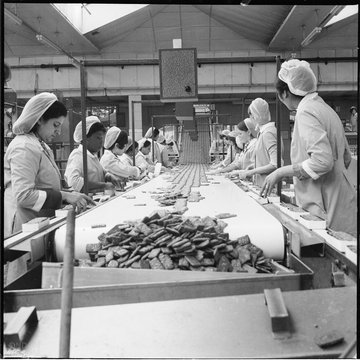
Work
Explore how South Asians in Britain took part in wide-ranging forms of work from the 1830s to the present
Overview
South Asians have long migrated to the United Kingdom to engage in various forms of work. Lascars, who were employed on British merchant ships and frequently undertook difficult engine-room labour for less pay than European sailors, would often wait in port towns for passage back home, and at times jumped ship. In response, Christian missionaries set up organizations such as the Glasgow Seamen's Friend Society in 1822, which offered temporary accommodation as well as religious instruction. Ayahs (nannies) would accompany British families on the long journey from India to Britain to take care of their employers' children. Some faced abandonment and destitution if their contracts were not honoured. The Ayahs' Home, which was established by a Mrs Rogers in Aldgate in the 1820s, became a critical source of support.
From the early twentieth century, pedlars (door-to-door salesmen) would travel and settle across Britain. 2 Bedeque Street in Belfast, which was owned by Mohamed Din who migrated to the city in 1929, was home to eleven Indian pedlars who worked with Din to sell women’s clothing. In the 1950s Abdul (Johnny) Karim forged connections with locals across the Hebrides, where he sold women’s clothes door-to-door.
Following the Second World War, Britain looked to its colonies to recruit workers who could remedy labour shortages in key industries. Moreover, some highly qualified South Asians were compelled to undertake manual labour as their qualifications were not recognized in the UK. In turn, thousands of South Asians helped rebuild post-war Britain. Birmid Industries, a foundry group, was a major recruiter of South Asians in the Midlands and it is where Avtar Singh Jouhl was employed. At Birmid and other factories, such as the Mansfield Hosiery Mills in Loughborough, South Asians went on strike to resist discriminatory hiring and management practices. From the mid-twentieth century onwards, homeworking became a significant source of employment for South Asian women in places such as Bradford. This minimally regulated form of work instigated collective action by organizations such as the West Yorkshire Homeworking Group.
Businesses led by South Asians have socially and economically transformed Britain. Sake Dean Mahomed, a shampooing surgeon and restaurateur, established Britain’s first Indian restaurant, the Hindoostane Coffee House, in London in 1810. Subsequently, South Asians have established wide-ranging businesses. Nagina Singh, who settled in Bristol following his migration to Britain in 1948, ran a drapery business in St Paul's, Bristol between the 1960s and 1990s. Vijay and Bhikhu Patel started a pharmacy business in Leigh-on-Sea, Essex in 1975, which rapidly expanded to become the global pharmaceutical company Waymade Healthcare.
Another interesting thing
The healthcare sector has been a significant source of work for South Asians in Britain. From the late nineteenth century, doctors such as Upendra Krishna Dutt and Jainti Saggar served working-class communities across Britain and often became involved with welfare campaigning. The establishment of the NHS in 1948 created opportunities for South Asians to obtain employment in Britain’s healthcare sector. Gulzar Waljee was among the thousands of people who were recruited from the Commonwealth to work for the NHS. Ossie Fernando migrated from Sri Lanka in 1963 to receive training as a surgeon at Royal Free Hospital. He subsequently became a pioneer in kidney transplant methods.
Browse this theme
Image credit
United Biscuits Ltd factory, Isleworth, 1972 by Henry Grant, HG2744/12 © Henry Grant Collection/London Museum, https://creativecommons.org/licenses/by-nc/4.0/
